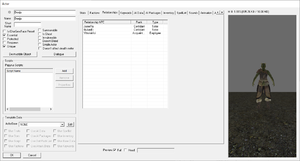Difference between revisions of "Relationships Tab"
Jump to navigation
Jump to search
imported>Eishunsama |
DavidJCobb (talk | contribs) (image) |
||
| (One intermediate revision by one other user not shown) | |||
| Line 1: | Line 1: | ||
[[File:ActorWindowRelationshipsTab.png|300px|thumb|right]] | |||
To create | The [[Actor]] Relationships Tab lets you specify that an Actor has a [[Relationship]] with another Actor. Each relationship is its own form, though you can create and edit those forms from here via the context menu. | ||
To create a relationship, right-click on the list and select New, and then enter the following details: | |||
* '''ID:''' Every relationship must have an ID. These typically mention both actors in the relationship: for example "ProventusAvenicciAdrianneAvenicci". | * '''ID:''' Every relationship must have an ID. These typically mention both actors in the relationship: for example "ProventusAvenicciAdrianneAvenicci". | ||
| Line 15: | Line 17: | ||
See the [[Relationship]] page for more details. | See the [[Relationship]] page for more details. | ||
{{Languages | {{Languages}} | ||
Latest revision as of 14:47, 25 July 2024
The Actor Relationships Tab lets you specify that an Actor has a Relationship with another Actor. Each relationship is its own form, though you can create and edit those forms from here via the context menu.
To create a relationship, right-click on the list and select New, and then enter the following details:
- ID: Every relationship must have an ID. These typically mention both actors in the relationship: for example "ProventusAvenicciAdrianneAvenicci".
- ParentNPC and ChildNPC: One actor should be specified as the Parent NPC, one as the child. With some relationships - spouses, for example - it does not really matter which actor is which, but it is more important for other relationship types, such as parent-child, or boss-employee.
- Relationship level: This sets the degree of affection or dislike between the NPCs, and ranges from Lover to ArchNemesis. 'Acquaintance' is the emotionally neutral setting.
- Association type: Optional. This sets the kind of relationship it is. Most standard relationships are familial (e.g. siblings, cousins), romantic (courting, spouse), or economic (boss-employee, BusinessPartners); however, you can create custom association types as well.
The Secret checkbox is not used.
See the Relationship page for more details.
| Language: | English • français • 日本語 |
|---|
